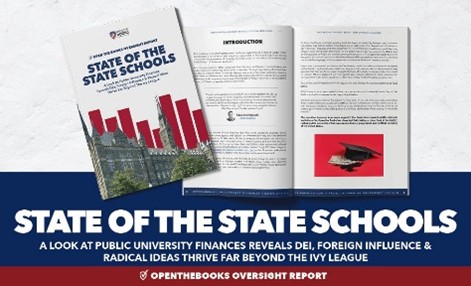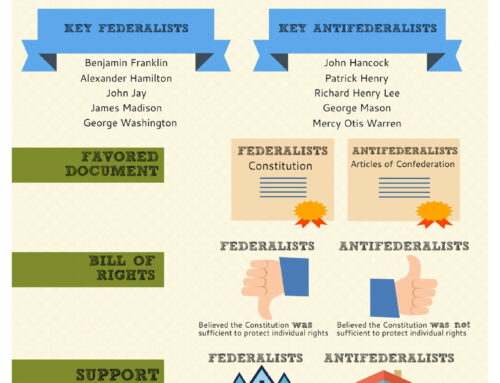
STATE OF THE STATE SCHOOLS
A Look at Public University Finances Reveals DEI, Foreign Influence and Radical Ideas Thrive Far Beyond the Ivy League
By OpenTheBooks – Mar 04, 2025
The brutal terrorist attack perpetrated by Hamas against Israeli civilians on October 7, 2023 accelerated a remarkable and ongoing realignment in the Middle East. It also had the unintended consequence of drawing back the curtain on the radical culture that has taken hold of much of American academia.
As chaos erupted on “elite” campuses like Columbia and Harvard, these institutions came under intense scrutiny they hadn’t seen in decades. Through transparency efforts from Open the Books, independent journalists, donors and even a few brave employees, it became clear these universities had been ideologically captured by left-wing radicalism. Coursework, professors and programming were promoting anti-American, neo-Marxist notions under the banner of “diversity, equity and inclusion” (DEI).
“Parents who watched this spectacle are wondering where the $80,000 a year they pay in tuition is going, and whether the “education” their children are receiving is worth the price tag. American taxpayers who can hardly afford an Ivy League education but are equally disturbed by the moral rot they’re seeing might be even more alarmed to discover that they are personally underwriting it.”
—Adam Andrzejewski, Tablet Magazine
By following the money, it also became clear that these universities prospered more as awardees of government grants and special tax treatment than they did as straightforward educational institutions. In the cases of the Ivy Leagues, Northwestern and Stanford, our findings demonstrated they collected more in research grants each year than they did in undergraduate tuition. At the same time, their multibillion-dollar endowments ballooned with a favorable tax rate granted to them as “public charities.” Since 2017, these colleges are only subject to a 1.4 percent excessive endowments tax: not the 20 percent capital gains tax levied on wealthy Americans. Before that, the endowments weren’t taxed at all.
Those endowments grew, of course, with the help of private donations. And in many cases, those donations came from foreign entities and states; many friendly, some adversarial. Countries like Qatar, Saudi Arabia and China frequently were in the mix, making contributions in return for seats for their own nationals or influence over programming.
As Open the Books continued peeling back the layers of university finances, we uncovered yet another way federal dollars were propping up radicalism. The Department of Education offers Foreign Language and Area Studies (FLAS) grants that are meant to support the study of lesser-known languages and regions of the globe. Centers for the study of the Middle East and languages like Arabic are counted among the recipients. The supposed public benefit of the grants is to turn out professionals who understand the geopolitical terrain of a given area, can speak the language, and can represent and advance American interests abroad.
In practice, controversial professors who’ve already made themselves at home in academia end up benefitting from these tax dollars; as they promote extreme ideas and coursework, they advance their own academic bona fides with the help of the feds. In one example, Columbia’s Dr. Joseph Massad appeared on FLAS grants applications; Massad became infamous for having written that Hamas’ attack was a “stunning victory for the Palestinian resistance.”
Four of the schools highlighted in this report are also among the top ten recipients of FLAS grants.
All of these factors have created a toxic campus environment indirectly fueled by our tax dollars, and with consequences far beyond graduation.
Students are free to choose the education they wish, of course; and as private universities, these wealthy institutions can teach what they like (within the bounds of the Constitution). But with hundreds of billions in grants flowing in and minimal tax revenue flowing back to the federal government, it raises the question: are these universities always acting in the public interest?
That question becomes even more urgent if the focus turns toward public, state-run institutions. So, Open the Books has done just that, taking a closer look at ten highly ranked public universities that represent a diverse geographic and political sampling of the United States.
Transparency revolutionizes U.S. public policy and politics.





Leave A Comment